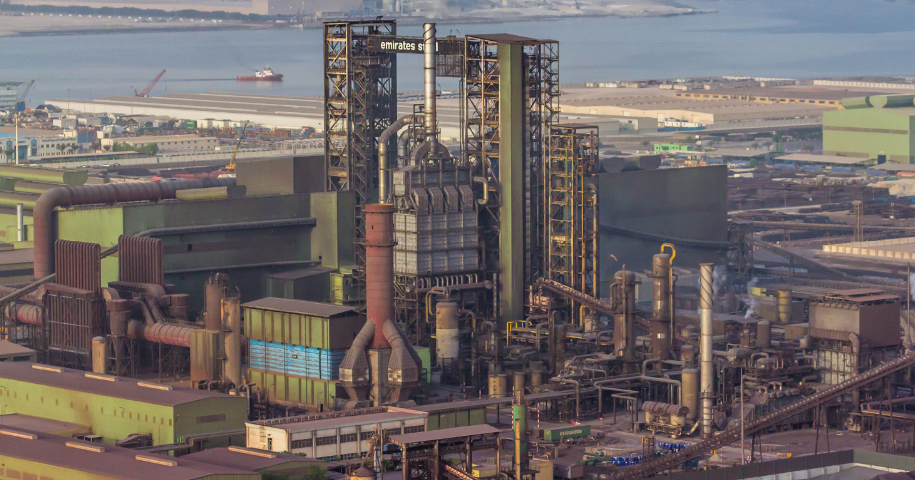Emirates steel creates opportunities for downstream manufacturing industries
- PRODUCTION OF WIRE ROD IN THE UAE EXPECTED TO REMAIN AT 724,000 TONS UP TILL 2015.
- THERE ARE TODAY 20 TO 25, GENERALLY SMALL, LOCAL COMPANIES USING WIRE ROD FOR DOWNSTREAM PRODUCTION, AROUND 15 OF THEM ARE WIRE MESH MANUFACTURERS. THE REST ARE FABRICATING STEEL NAIL PRODUCTS.
Abu Dhabi, United Arab Emirates, 25 January 2015
UAE steelmaker Emirates Steel is expanding the range of its wire rod brands following the development of their local industrial users particularly wires for welded mesh, nails, hangers, screws, chain link and gabion fencing, wire nets, barbed wires and binding wires, welding electrodes, nuts, bolts, rivets, PC strands and many other such materials.
“Our innovation and continuous improvement will play a major role in creating clean and consistent quality wire rod products,” said HE Saeed G Al Romaithi, Emirates Steel CEO. “That is why we are constantly expanding our range of sizes and chemistries to meet more demanding criteria,” he added. At present, Emirates Steel is relying on its own R&D capabilities to produce special grades of high carbon wire rod that would be used in the production of lighter automotive components, like car springs and tire reinforcement cords; high-tensile ropes for bridges and wire ropes for the oil and gas industry that can withstand harsher environments.
The Senaat-owned steelmaker today has the capacity to produce 600,000 metric tons of wire rods per annum. According to Emirates Steel figures, production of wire rod in the UAE is expected to remain at around 724,000 tons up till 2015, while exports will remain at around 500,000 tons. For steel in general, a recent BMI forecast report estimated the UAE’s crude steel production in 2018 at 3.04 million tons, marking an annual average growth of 3.8% from 2013 estimates. BMI also forecast the consumption of steel to rise from 9.5 million tons in 2013 to 13.3 million tons in 2018.
“There is little local value added in the domestic steel and industry and this is one reason why we are looking at downstream integration with other local manufacturing industries,” commented Al Romaithi. Another reason for that is to protect the local steel industry from foreign dumping. Emirates Steel manufactures wire rods in a continuous casting and rolling process, turning billets into premium quality wire rod in diameters of 5.5mm to 16mm.
“Abu Dhabi is on track to fulfil its ambitions for the industrial sector,” Al Romaithi highlighted. Using its hydrocarbons resources to diversify into energy-intensive industries, the emirate’s manufacturing base will continue to grow in the coming years. The government has put the infrastructure in place, both in terms of industrial zones and transport investment and also regulations, to support this growth. “Large-scale industries, such as Emirates Steel, should help to facilitate the development of smaller downstream segments. And in the coming years, the emirate is likely to see increasing production of semi-finished and finished higher-value products,” he stated.
At present, the UAE still depends on wire rod downstream products imports with little domestic production. According to our count, there are today 20 to 25, generally small, local companies using wire rod for downstream production, around 15 of them are wire mesh manufacturers. The rest are fabricating steel nail products.
“As part of Abu Dhabi’s 2030 Economic Vision, which aims to diversify the emirate’s economy by adding strength to the industrial sector, our government has lent its support to the development of steel downstream clusters,” said Al Romaithi. “Our strategy for the medium and long term is to support this government initiative by creating further opportunities for downstream manufacturing industries,” he added. Emirates Steel believes that about 30% of its total production of wire rod is now being used by the domestic steel downstream manufacturing industry.
“To cater for varied downstream customer needs, we have introduced different grades of wire-rods with diverse chemical compositions and distinctive physical properties,” Al Romaithi pointed out. “We are flexible to meet the different requirements of downstream customers on many steel grades and diameters,” he reiterated. Emirates Steel is recognized as one of the leading wire rod producers in the GCC. The Company’s carbon steel wire rod, which is produced by a high-speed (110m/sec) wire rod mill, corresponds to HS trade code 7213 and all sub-headings. These standards are described for wire rods equivalent to SAE/AISI. Emirates Steel’s wire rod is certified by SIRIM of Malaysia for grades C4D to C62D.
“Our research and development expertise and detailed understanding of wire rod allow us to work in partnership with local downstream industries to develop new and more advanced brands and grades of wire rod steel for increasingly demanding applications, helping them create value in our local market,” Al Romaithi pointed out. “Through close collaboration we can develop, test and refine wire rod products for specific uses,” he confirmed.
Emirates Steel’s rod mill has the shortest rolling program cycle of any major steelmaker in the GCC region, which means that the company can meet short lead times for its local industrial users. This enables the three-billion dollar UAE steelmaker to react quickly to demand from local manufacturers and improve its responsiveness to changing downstream market conditions. Intensive spending on construction and infrastructure projects in the UAE has resulted in an increase in the country’s steel production capacity; today, the UAE has 4.1 million tons of rebar capacity installed, 1 million tons of section capacity and 800,000 tons of wire rod capacity.

